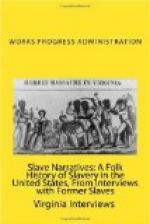“I’se knowed slaves to run away, an’ I’se seen ’em whupped. I seen good marsters an’ mean ones. Dey was good slaves an’ mean ones. But to tell de truf, if dey tol’ a slave to do anything, den he jus’ better do it.
“I was big’ nough in de Civil War to drive five yoke o’ steers to Mobile an’ git grub to feed de wimmins an’ chilluns. Some o’ de mens was a-fightin’ an’ some was a-runnin’ an’ hidin’. I was a slave an’ I had to do what dey tol’ me. I carried grub into de swamp to men, but I never knowed what dey was a-hidin’ from.”
(This may be explained by the fact that Uncle Henri was owned by and lived in a settlement of French People, many of whom probably had no convictions or feeling of loyalty, one way or the other, during the War Between the States.)
“My old Marster had fo’ sons, an’ de younges’ one went to de war an’ was killed.
“De Yankees come to Pass Christian, I was dere, an’ seen ’em. Dey come up de river an’ tore up things as dey went along.
“I was 31 years old when I was set free. My Marster didn’ tell us’ bout bein’ free. De way I foun’ it out, he started to whup me once an’ de young Marster up an’ says, ’You aint got no right to whup him now, he’s free.’ Den Marster turnt me loose.
“It was dem Carpetbaggers dat ‘stroyed de country. Dey went an’ turned us loose, jus’ lak a passel o’ cattle, an’ didn’ show us nothin’ or giv’ us nothin’. Dey was acres an’ acres o’ lan’ not in use, an’ lots o’ timber in dis country. Dey should-a give each one o’ us a little farm an’ let us git out timber an’ build houses. Dey ought to put a white Marster over us, to show us an’ make us work, only let us be free ’stead o’ slaves. I think dat would-a been better ‘n turnin’ us loose lak dey done.
“I lef’ my Marster an’ went over to de Jordon River, an’ dere I stayed an’ worked. I saved my money an’ dat giv’ me a start. I never touched it’ til de year was winded up. To tell da truf, de fac’s o’ de matter is, it was my Marstars kinfolks I was workin’ for.
“I bought me a schooner wid dat money an’ carried charcoal to N’awlins. I done dis for ‘bout two years an’ den I los’ my schooner in a storm off o’ Bay St. Louis.
“After I los’ my schooner, I come here an’ got married. Dis was in 1875 an’ I was 43 years old. Dat was my firs’ time to marry. I’se got dat same wife today. She was born a slave, too. I didn’ have no chillun, but my wife did. She had one gal-chil’. She lives at Westonia an’ is de mammy o’ ten chillun. She done better’n us done. I’se got a lot o’ gran’-chillun. What does you call de nex’ den? Lemme see, great gran’-chillun, dat’s it.
“I never did b’lieve in no ghos’ an’ hoodoos an’ charms.
“I never did look for to git nothin’ after I was free. I had dat in my head to git me 80 acres o’ lan’ an’ homestead it. As for de gov’ment making me a present o’ anything, I never thought ‘bout it. But jus’ now I needs it.




